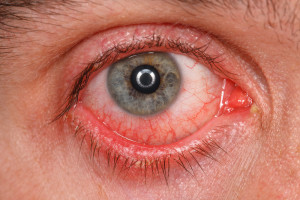Introduction
Conjunctivitis is an inflammation of the conjunctiva. The conjunctiva is a membrane that contains blood vessels and that lines the sclera (the white of the eye) and the inside surface of the eye lids.
When it is inflamed the blood vessels experience engorgement and the eye has a “pink eye” appearance. The causes for such an inflammation can be a viral conjunctivitis, a bacterial conjunctivitis or an allergic conjunctivitis. Sometimes it is due to a small foreign body such as dust or metal etc.
Among viral illnesses measles, pink eye, herpes and shingles are common causes of an acute conjunctivitis. Bacterial infections such as the STD’s (gonorrhea or chlamydia) are also common. The table below lists more details.
Signs and symptoms
The signs and symptoms vary a lot depending on the underlying cause. See the table below for the most common causes. There are also links to more texts.
Diagnostic tests
Diagnostic tests depend on the clinical presentation and the history. Pain, sensitivity to light and blurred vision are common. Pain is particularly bad with herpetic conjunctivitis. Itching is typical for allergic conjunctivitis. There is a discharge from the eye and the composition of it (watery, pussy etc.) tells the physician what the underlying cause may be in connection with bacterial cultures and viral tests.
Various types of conjunctivitis
| Name: | Cause and explanation: |
| viral conjunctivitis | most cases of conjunctivitis are due to a virus. This can cause pink eye on the one hand, which is self limiting. But it can also be caused from more severe viruses such as in measles conjunctivitis , herpetic conjunctivitis (herpes simplex or herpes zoster) |
| bacterial conjunctivitis | bacteria cause a pussy (yellow or greenish) eye discharge. The danger is perforation due to ulceration |
| gonococcal / chlamydial conjunctivitis | in newborns these bacteria come from a contaminated birth canal; in adults they are sexually transmitted |
| allergic conjunctivitis | histamine release from allergic reactions and immune complexes can cause acute inflammation of the conjunctiva |
Treatment
Treatment is directed against the underlying cause. Depending on whether it is acute or chronic and what the underlying cause is, the treatment will vary considerably as is detailed in these links from Ref.1 and 2 below).
References
1. The Merck Manual: Eye diseases
2. Ferri: Ferri’s Clinical Advisor: Instant Diagnosis and Treatment, 2004 ed., Copyright © 2004 Mosby, Inc.
3. Rakel: Conn’s Current Therapy 2004, 56th ed., Copyright © 2004 Elsevier







